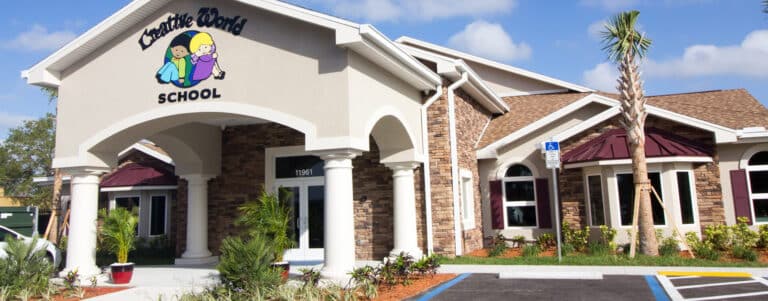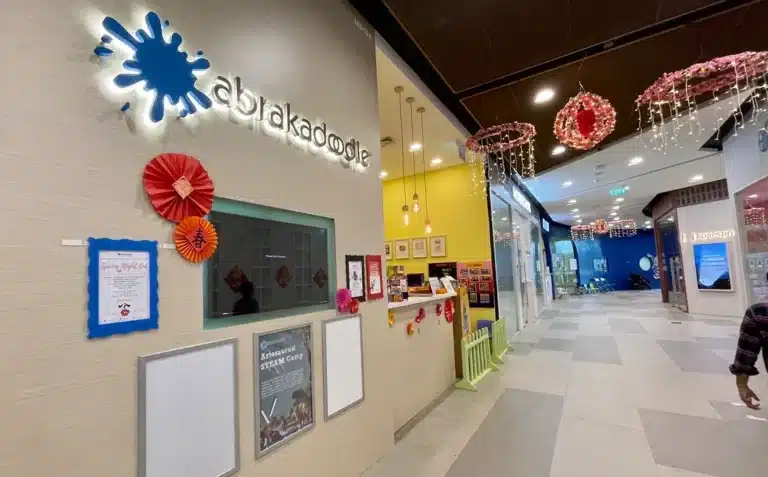Class 101 Franchise FDD, Profits & Costs (2025)
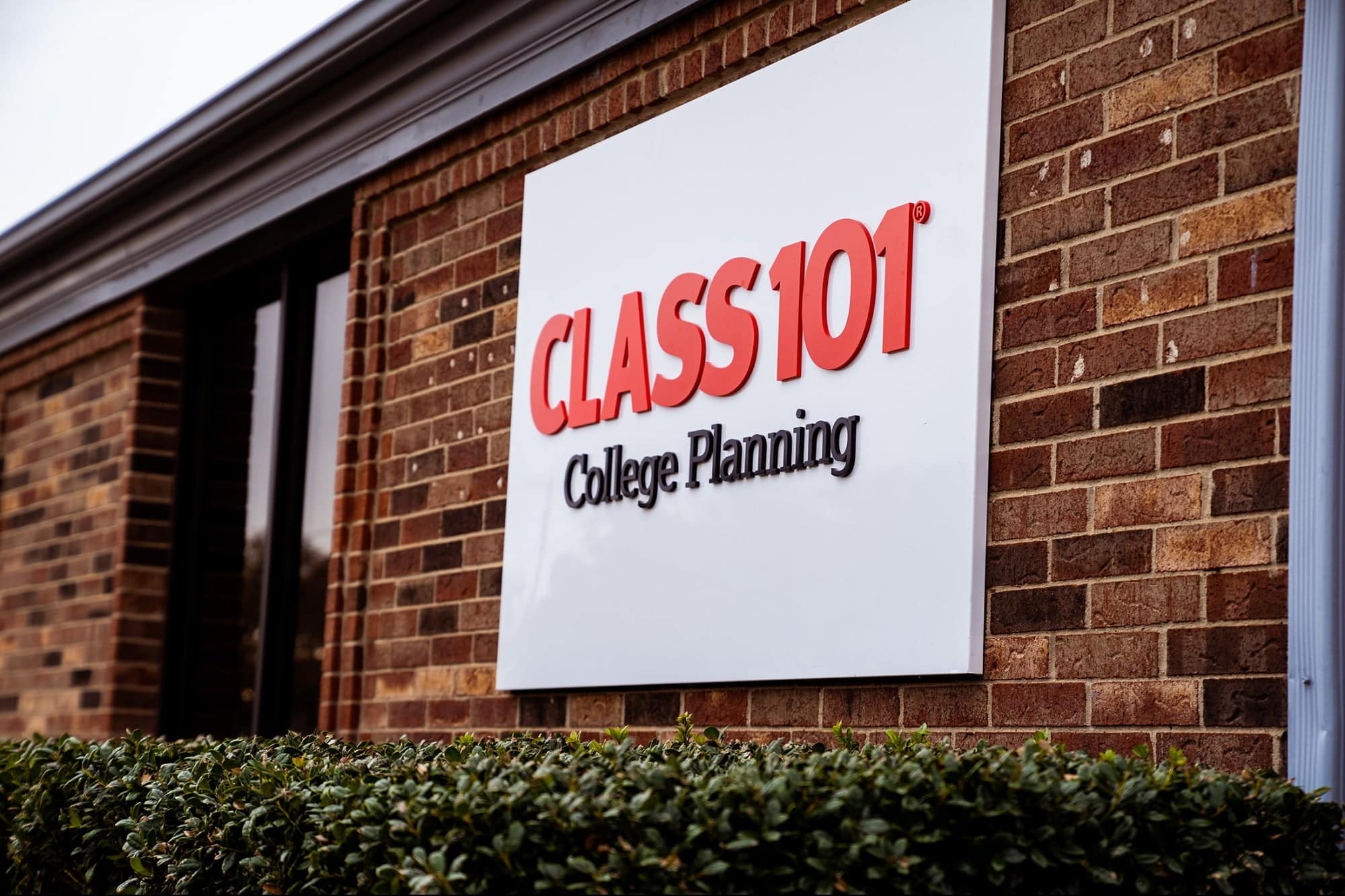
Class 101, founded in 1997 by Tom Pabin in Lexington, Kentucky, is a nationwide college planning franchise dedicated to guiding high school students through the complex process of college admissions. With its headquarters now located in Bedford, Texas, Class 101 has expanded its reach to 65 locations across 28 states.
The franchise offers a comprehensive suite of services designed to assist students in every aspect of college preparation.
These services include developing personalized college lists, organizing campus visits, improving academic performance, providing ACT/SAT/PSAT test preparation, enhancing resumes, crafting compelling college essays, managing application deadlines, exploring scholarship opportunities, and navigating financial aid processes such as FAFSA.
What sets Class 101 apart from its competitors is its proven track record of success and personalized approach. The franchise’s methods have resulted in an average acceptance rate of 85% for its students, with each student receiving an average of $200,000 in merit scholarships.
Initial Investment
How much does it cost to start a Class 101 franchise? It costs on average between $75,000 – $130,000 to start a Class 101 franchised business.
This includes costs for office setup, technology, marketing, and initial operational expenses. The exact amount depends on various factors, including the location, the size of the territory, and whether the franchisee chooses to lease or purchase office space.
| Type of Expenditure | Amount (Low – High) |
|---|---|
| Initial Franchise Fee | $39,900 – $39,900 |
| Lease Payments (one month rent and security deposit) | $0 – $7,000 |
| Leasehold and Tenant Improvements | $1,500 – $10,000 |
| Signage (Exterior and Interior) | $2,000 – $12,000 |
| Furniture, Fixtures and Equipment | $2,000 – $10,000 |
| Computer Systems, A/V, Security and Other Systems | $3,000 – $5,000 |
| Training Related Expenses | $2,500 – $5,000 |
| Legal, Accounting and other Professional Fees | $1,500 – $7,000 |
| Technology Fees | $447 – $447 |
| Insurance Deposit | $1,440 – $1,840 |
| Business Licenses and Permits | $500 – $1,000 |
| Grand Opening Marketing | $10,000 – $15,000 |
| Initial Supplies | $500 – $1,000 |
| Additional Funds – 3 Months | $10,000 – $15,000 |
| TOTAL | $75,287 – $130,187 |
Average Revenue (AUV)
How much revenue can you make with a Class 101 franchise? A Class 101 franchised facility makes on average $164,000 in revenue (AUV) per year.
Here is the extract from the Franchise Disclosure Document:
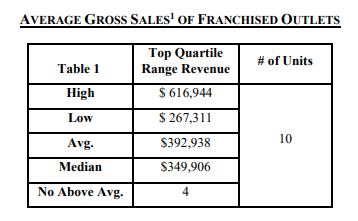
This compares to $205,000 yearly revenue for similar tutoring franchises. Below are a few Class 101 competitors as a comparison:
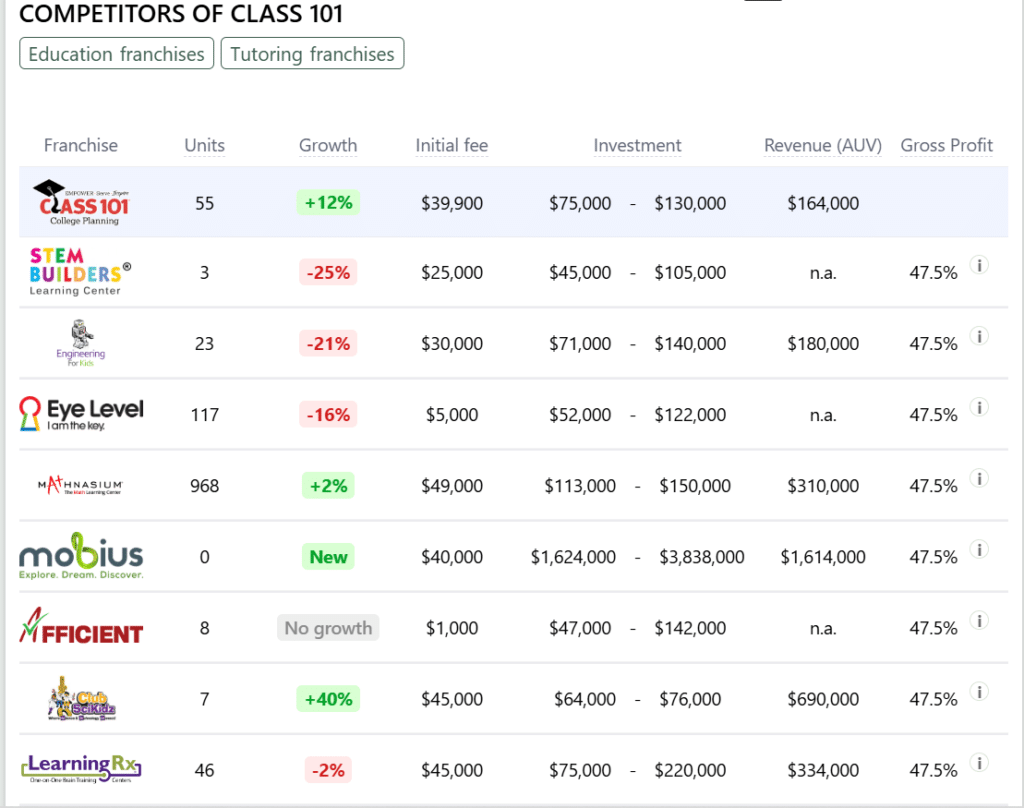
Download the Franchise Disclosure Document
Frequently Asked Questions
How many Class 101 locations are there?
As of the latest data, Class 101 operates over 56 franchise-owned locations across 28 states. and one company-owned location.
What is the total investment required to open a Class 101 franchise?
The total investment required to open a Class 101 franchise ranges from $75,000 to $130,000.
What are the ongoing fees for a Class 101 franchise?
Class 101 franchisees are required to pay an ongoing royalty fee of 8% of their gross sales. Additionally, there is an advertising fee, which varies between 2% and 5% of gross sales, allocated towards marketing and promotional efforts to enhance brand visibility and attract potential clients.
What are the financial requirements to become a Class 101 franchisee?
To become a Class 101 franchisee, candidates are required to have a minimum net worth of $75,000 and at least $50,000 in liquid capital. These financial prerequisites ensure that franchisees possess the necessary resources to establish and sustain their business effectively.
How much can a Class 101 franchise owner expect to earn?
The average gross sales for a Class 101 franchise are approximately $0.16 million per location. Assuming a 15% operating profit margin, $0.16 million yearly revenue can result in $24,000 EBITDA annually.
Who owns Class 101?
Class 101 is owned by its founder, Tom Pabin. Established in the late 1990s, Tom launched the company to assist students and families in navigating the complex college admissions process.
Disclaimer
Disclaimer: This content has been made for informational and educational purposes only. We do not make any representation or warranties with respect to the accuracy, applicability, fitness, or completeness of the information presented in the article. You should not construe any such information or other material as legal, tax, investment, financial, or other professional advice. Nothing contained in this article constitutes a solicitation, recommendation, endorsement, advertisement, or offer to buy or sell any franchises, securities, or other financial instruments in this or in any other jurisdiction in which such solicitation or offer would be unlawful under the franchise and/or securities laws of such jurisdiction.
All content in this article is information of a general nature and does not address the detailed circumstances of any particular individual or entity. Nothing in the article constitutes professional and/or financial and/or legal advice, nor does any information in the article constitute a comprehensive or complete statement of the matters discussed or the law relating thereto. You alone assume the sole responsibility of evaluating the merits and risks associated with the use of any information or other content in this article before making any decisions based on such information or other content.


